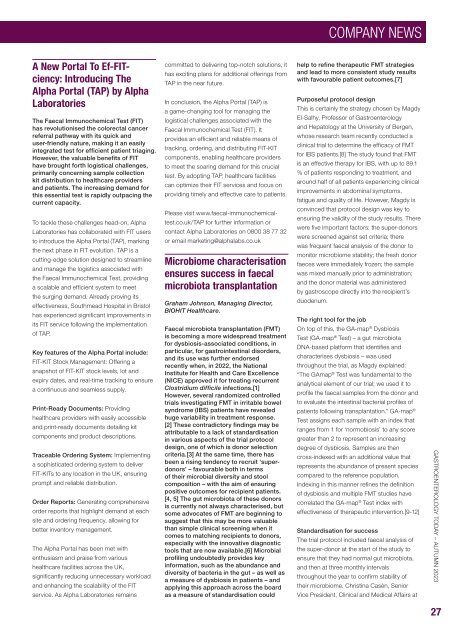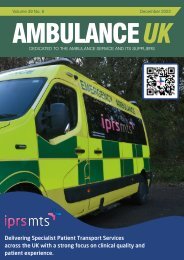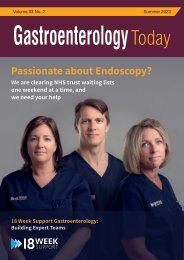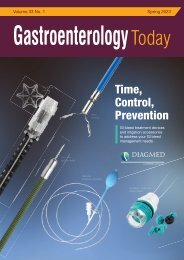Gastroenterology Today Autumn 2023
Gastroenterology Today Autumn 2023
Gastroenterology Today Autumn 2023
You also want an ePaper? Increase the reach of your titles
YUMPU automatically turns print PDFs into web optimized ePapers that Google loves.
COMPANY NEWS<br />
A New Portal To Ef-FITciency:<br />
Introducing The<br />
Alpha Portal (TAP) by Alpha<br />
Laboratories<br />
The Faecal Immunochemical Test (FIT)<br />
has revolutionised the colorectal cancer<br />
referral pathway with its quick and<br />
user-friendly nature, making it an easily<br />
integrated test for efficient patient triaging.<br />
However, the valuable benefits of FIT<br />
have brought forth logistical challenges,<br />
primarily concerning sample collection<br />
kit distribution to healthcare providers<br />
and patients. The increasing demand for<br />
this essential test is rapidly outpacing the<br />
current capacity.<br />
To tackle these challenges head-on, Alpha<br />
Laboratories has collaborated with FIT users<br />
to introduce the Alpha Portal (TAP), marking<br />
the next phase in FIT evolution. TAP is a<br />
cutting-edge solution designed to streamline<br />
and manage the logistics associated with<br />
the Faecal Immunochemical Test, providing<br />
a scalable and efficient system to meet<br />
the surging demand. Already proving its<br />
effectiveness, Southmead Hospital in Bristol<br />
has experienced significant improvements in<br />
its FIT service following the implementation<br />
of TAP.<br />
Key features of the Alpha Portal include:<br />
FIT-KIT Stock Management: Offering a<br />
snapshot of FIT-KIT stock levels, lot and<br />
expiry dates, and real-time tracking to ensure<br />
a continuous and seamless supply.<br />
Print-Ready Documents: Providing<br />
healthcare providers with easily accessible<br />
and print-ready documents detailing kit<br />
components and product descriptions.<br />
Traceable Ordering System: Implementing<br />
a sophisticated ordering system to deliver<br />
FIT-KITs to any location in the UK, ensuring<br />
prompt and reliable distribution.<br />
Order Reports: Generating comprehensive<br />
order reports that highlight demand at each<br />
site and ordering frequency, allowing for<br />
better inventory management.<br />
The Alpha Portal has been met with<br />
enthusiasm and praise from various<br />
healthcare facilities across the UK,<br />
significantly reducing unnecessary workload<br />
and enhancing the scalability of the FIT<br />
service. As Alpha Laboratories remains<br />
committed to delivering top-notch solutions, it<br />
has exciting plans for additional offerings from<br />
TAP in the near future.<br />
In conclusion, the Alpha Portal (TAP) is<br />
a game-changing tool for managing the<br />
logistical challenges associated with the<br />
Faecal Immunochemical Test (FIT). It<br />
provides an efficient and reliable means of<br />
tracking, ordering, and distributing FIT-KIT<br />
components, enabling healthcare providers<br />
to meet the soaring demand for this crucial<br />
test. By adopting TAP, healthcare facilities<br />
can optimize their FIT services and focus on<br />
providing timely and effective care to patients.<br />
Please visit www.faecal-immunochemicaltest.co.uk/TAP<br />
for further information or<br />
contact Alpha Laboratories on 0800 38 77 32<br />
or email marketing@alphalabs.co.uk<br />
Microbiome characterisation<br />
ensures success in faecal<br />
microbiota transplantation<br />
Graham Johnson, Managing Director,<br />
BIOHIT Healthcare.<br />
Faecal microbiota transplantation (FMT)<br />
is becoming a more widespread treatment<br />
for dysbiosis-associated conditions, in<br />
particular, for gastrointestinal disorders,<br />
and its use was further endorsed<br />
recently when, in 2022, the National<br />
Institute for Health and Care Excellence<br />
(NICE) approved it for treating recurrent<br />
Clostridium difficile infections.[1]<br />
However, several randomized controlled<br />
trials investigating FMT in irritable bowel<br />
syndrome (IBS) patients have revealed<br />
huge variability in treatment response.<br />
[2] These contradictory findings may be<br />
attributable to a lack of standardisation<br />
in various aspects of the trial protocol<br />
design, one of which is donor selection<br />
criteria.[3] At the same time, there has<br />
been a rising tendency to recruit ‘superdonors’<br />
– favourable both in terms<br />
of their microbial diversity and stool<br />
composition – with the aim of ensuring<br />
positive outcomes for recipient patients.<br />
[4, 5] The gut microbiota of these donors<br />
is currently not always characterised, but<br />
some advocates of FMT are beginning to<br />
suggest that this may be more valuable<br />
than simple clinical screening when it<br />
comes to matching recipients to donors,<br />
especially with the innovative diagnostic<br />
tools that are now available.[6] Microbial<br />
profiling undoubtedly provides key<br />
information, such as the abundance and<br />
diversity of bacteria in the gut – as well as<br />
a measure of dysbiosis in patients – and<br />
applying this approach across the board<br />
as a measure of standardisation could<br />
help to refine therapeutic FMT strategies<br />
and lead to more consistent study results<br />
with favourable patient outcomes.[7]<br />
Purposeful protocol design<br />
This is certainly the strategy chosen by Magdy<br />
El-Salhy, Professor of <strong>Gastroenterology</strong><br />
and Hepatology at the University of Bergen,<br />
whose research team recently conducted a<br />
clinical trial to determine the efficacy of FMT<br />
for IBS patients.[8] The study found that FMT<br />
is an effective therapy for IBS, with up to 89.1<br />
% of patients responding to treatment, and<br />
around half of all patients experiencing clinical<br />
improvements in abdominal symptoms,<br />
fatigue and quality of life. However, Magdy is<br />
convinced that protocol design was key to<br />
ensuring the validity of the study results. There<br />
were five important factors: the super-donors<br />
were screened against set criteria; there<br />
was frequent faecal analysis of the donor to<br />
monitor microbiome stability; the fresh donor<br />
faeces were immediately frozen; the sample<br />
was mixed manually prior to administration;<br />
and the donor material was administered<br />
by gastroscope directly into the recipient’s<br />
duodenum.<br />
The right tool for the job<br />
On top of this, the GA-map ® Dysbiosis<br />
Test (GA-map ® Test) – a gut microbiota<br />
DNA-based platform that identifies and<br />
characterises dysbiosis – was used<br />
throughout the trial, as Magdy explained:<br />
“The GA map ® Test was fundamental to the<br />
analytical element of our trial; we used it to<br />
profile the faecal samples from the donor and<br />
to evaluate the intestinal bacterial profiles of<br />
patients following transplantation.” GA-map ®<br />
Test assigns each sample with an index that<br />
ranges from 1 for ‘normobiosis’ to any score<br />
greater than 2 to represent an increasing<br />
degree of dysbiosis. Samples are then<br />
cross-indexed with an additional value that<br />
represents the abundance of present species<br />
compared to the reference population.<br />
Indexing in this manner refines the definition<br />
of dysbiosis and multiple FMT studies have<br />
correlated the GA-map ® Test index with<br />
effectiveness of therapeutic intervention.[9-12]<br />
Standardisation for success<br />
The trial protocol included faecal analysis of<br />
the super-donor at the start of the study to<br />
ensure that they had normal gut microbiota,<br />
and then at three monthly intervals<br />
throughout the year to confirm stability of<br />
their microbiome. Christina Casèn, Senior<br />
Vice President, Clinical and Medical Affairs at<br />
GASTROENTEROLOGY TODAY – AUTUMN <strong>2023</strong><br />
27
















